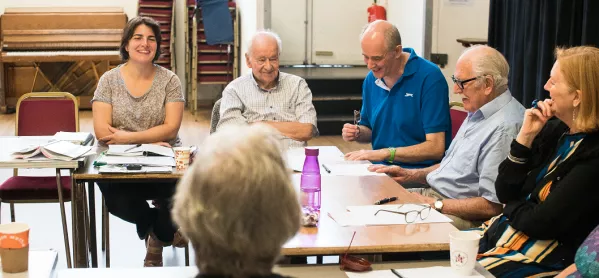Stephen Bush has been a great advocate for learning throughout his life, having taken and taught numerous courses in diverse subjects, and studying at City Lit for over 30 years. In addition to his career in social services, he also taught A-level art history in the evenings, as well as giving lectures in art galleries. But when it became apparent that his mother’s Alzheimer’s disease was progressing, he put the MA he was taking on hold, took early retirement, and effectively became a full-time carer for his mother for almost 12 years.
Stephen’s mother took part of a clinical trial aiming to slow down the progression of Alzheimer’s and though it wasn’t a cure, it did mean he could leave her for short periods. That enabled him to continue with his studies as a form of respite for himself and as a means to retain an independent identity. Stephen describes his formal learning throughout that period as “a great support”.
“Adult learning is curiosity in the first place,” he says. “Curiosity about a subject and finding a personal connection with that subject and a connection with the other people in the room.”
Stephen continued his journey in education after his mother’s death. He is committee member at the Claremont Project, which provides learning for people aged 55 and over, he is on the student panel at City Lit, and has been involved in learning projects at the Tate galleries.
Curiosity and connection to others
As his brother has also developed Alzheimer’s in his early 60s, Stephen is closely monitored in case the condition is an inherited one. He attends Reminiscence Theatre Group for those affected by dementia and their carers, which holds weekly workshops at Park Theatre in North London. The project values the carer and the individual, but treats them as separate people. Sessions give participants the opportunity to experience and create in the present, which Stephen says is in contrast to an “older view of reminiscence work where the person’s value is located in what they used to be and do”.
The theatre group not only acts as a welcoming forum to meet people in similar situations, but provides a platform to build confidence.
Stephen explains: “In daily life, the person affected (by dementia) tends to feel a failure, damaged goods, or a nuisance and the carer is liable to see their role as one of averting disaster. As confidence within the group grows the person and carer may split up, working in different groups or pairs.”
Though the theatre group is clearly an extremely valuable resource, Stephen advocates all lifelong learning, especially with regards to organised group sessions. In particular, he stresses the positive impact on health and wellbeing gained by being part of a community
“I don’t doubt the value of doing things like crosswords and Sudoku to keep the mind active, but there’s the social element of doing courses with other people, exploring something that you’re genuinely interested in,” he says. “It’s like buying a gym membership, you’re more likely to continue with it!”
‘A passion for learning’
Stephen Bush has been named as the 2017 Festival of Learning’s Patron’s Award winner. This award, is chosen by HRH, the Princess Royal, who is The Learning and Work Institute’s patron. The accolade celebrates Stephen’s commitment to lifelong learning and its transformational effect, as well as being a recognition of his role as an advocate and volunteer.
His nominator, Tabby Toussaint, head of humanities at City Lit says, “Stephen is always keen to give back to others what he has himself learnt. His passion for learning and gaining knowledge is a wonderful thing that inspires others to follow in his footsteps”
The Festival of Learning Awards highlight inspirational people and projects with stories that promote the transformational effect of learning regardless of any age and circumstance. Nominations for Festival of Learning Awards 2018 will open in November.
Want to keep up with the latest education news and opinion? Follow Tes FE News on Twitter, like us on Facebook and follow us on LinkedIn




